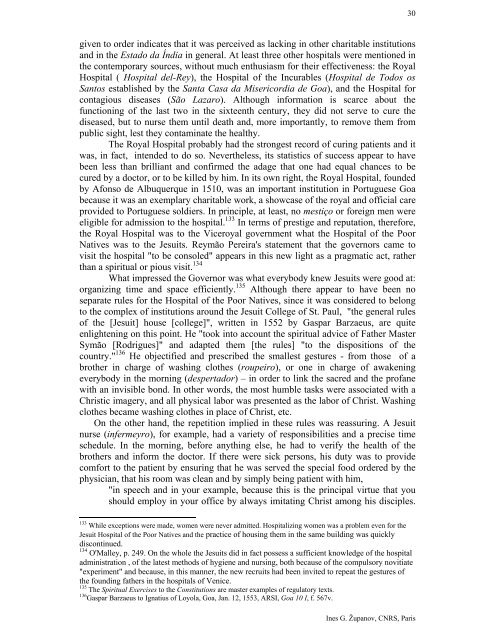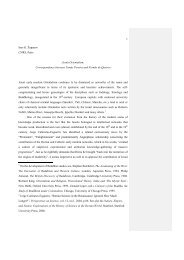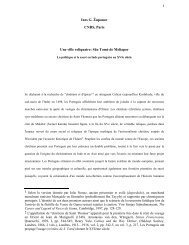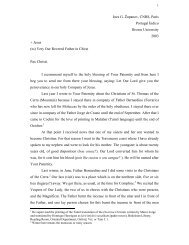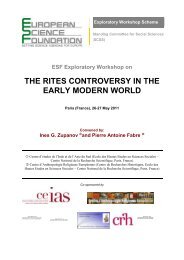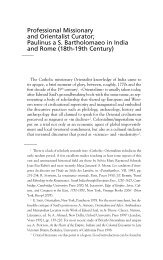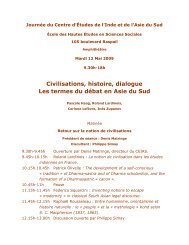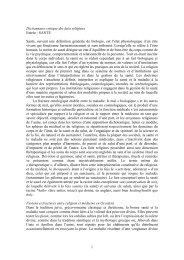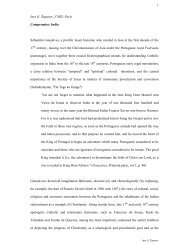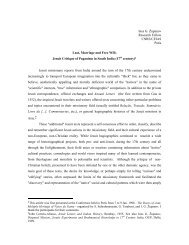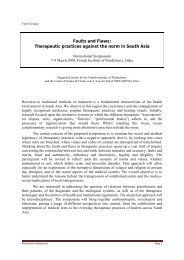Drugs, Health, Bodies and Souls in the Tropics ... - Ines G. Županov
Drugs, Health, Bodies and Souls in the Tropics ... - Ines G. Županov
Drugs, Health, Bodies and Souls in the Tropics ... - Ines G. Županov
You also want an ePaper? Increase the reach of your titles
YUMPU automatically turns print PDFs into web optimized ePapers that Google loves.
30<br />
given to order <strong>in</strong>dicates that it was perceived as lack<strong>in</strong>g <strong>in</strong> o<strong>the</strong>r charitable <strong>in</strong>stitutions<br />
<strong>and</strong> <strong>in</strong> <strong>the</strong> Estado da Índia <strong>in</strong> general. At least three o<strong>the</strong>r hospitals were mentioned <strong>in</strong><br />
<strong>the</strong> contemporary sources, without much enthusiasm for <strong>the</strong>ir effectiveness: <strong>the</strong> Royal<br />
Hospital ( Hospital del-Rey), <strong>the</strong> Hospital of <strong>the</strong> Incurables (Hospital de Todos os<br />
Santos established by <strong>the</strong> Santa Casa da Misericordia de Goa), <strong>and</strong> <strong>the</strong> Hospital for<br />
contagious diseases (São Lazaro). Although <strong>in</strong>formation is scarce about <strong>the</strong><br />
function<strong>in</strong>g of <strong>the</strong> last two <strong>in</strong> <strong>the</strong> sixteenth century, <strong>the</strong>y did not serve to cure <strong>the</strong><br />
diseased, but to nurse <strong>the</strong>m until death <strong>and</strong>, more importantly, to remove <strong>the</strong>m from<br />
public sight, lest <strong>the</strong>y contam<strong>in</strong>ate <strong>the</strong> healthy.<br />
The Royal Hospital probably had <strong>the</strong> strongest record of cur<strong>in</strong>g patients <strong>and</strong> it<br />
was, <strong>in</strong> fact, <strong>in</strong>tended to do so. Never<strong>the</strong>less, its statistics of success appear to have<br />
been less than brilliant <strong>and</strong> confirmed <strong>the</strong> adage that one had equal chances to be<br />
cured by a doctor, or to be killed by him. In its own right, <strong>the</strong> Royal Hospital, founded<br />
by Afonso de Albuquerque <strong>in</strong> 1510, was an important <strong>in</strong>stitution <strong>in</strong> Portuguese Goa<br />
because it was an exemplary charitable work, a showcase of <strong>the</strong> royal <strong>and</strong> official care<br />
provided to Portuguese soldiers. In pr<strong>in</strong>ciple, at least, no mestiço or foreign men were<br />
eligible for admission to <strong>the</strong> hospital. 133 In terms of prestige <strong>and</strong> reputation, <strong>the</strong>refore,<br />
<strong>the</strong> Royal Hospital was to <strong>the</strong> Viceroyal government what <strong>the</strong> Hospital of <strong>the</strong> Poor<br />
Natives was to <strong>the</strong> Jesuits. Reymão Pereira's statement that <strong>the</strong> governors came to<br />
visit <strong>the</strong> hospital "to be consoled" appears <strong>in</strong> this new light as a pragmatic act, ra<strong>the</strong>r<br />
than a spiritual or pious visit. 134<br />
What impressed <strong>the</strong> Governor was what everybody knew Jesuits were good at:<br />
organiz<strong>in</strong>g time <strong>and</strong> space efficiently. 135 Although <strong>the</strong>re appear to have been no<br />
separate rules for <strong>the</strong> Hospital of <strong>the</strong> Poor Natives, s<strong>in</strong>ce it was considered to belong<br />
to <strong>the</strong> complex of <strong>in</strong>stitutions around <strong>the</strong> Jesuit College of St. Paul, "<strong>the</strong> general rules<br />
of <strong>the</strong> [Jesuit] house [college]", written <strong>in</strong> 1552 by Gaspar Barzaeus, are quite<br />
enlighten<strong>in</strong>g on this po<strong>in</strong>t. He "took <strong>in</strong>to account <strong>the</strong> spiritual advice of Fa<strong>the</strong>r Master<br />
Symão [Rodrigues]" <strong>and</strong> adapted <strong>the</strong>m [<strong>the</strong> rules] "to <strong>the</strong> dispositions of <strong>the</strong><br />
country." 136 He objectified <strong>and</strong> prescribed <strong>the</strong> smallest gestures - from those of a<br />
bro<strong>the</strong>r <strong>in</strong> charge of wash<strong>in</strong>g clo<strong>the</strong>s (roupeiro), or one <strong>in</strong> charge of awaken<strong>in</strong>g<br />
everybody <strong>in</strong> <strong>the</strong> morn<strong>in</strong>g (despertador) – <strong>in</strong> order to l<strong>in</strong>k <strong>the</strong> sacred <strong>and</strong> <strong>the</strong> profane<br />
with an <strong>in</strong>visible bond. In o<strong>the</strong>r words, <strong>the</strong> most humble tasks were associated with a<br />
Christic imagery, <strong>and</strong> all physical labor was presented as <strong>the</strong> labor of Christ. Wash<strong>in</strong>g<br />
clo<strong>the</strong>s became wash<strong>in</strong>g clo<strong>the</strong>s <strong>in</strong> place of Christ, etc.<br />
On <strong>the</strong> o<strong>the</strong>r h<strong>and</strong>, <strong>the</strong> repetition implied <strong>in</strong> <strong>the</strong>se rules was reassur<strong>in</strong>g. A Jesuit<br />
nurse (<strong>in</strong>fermeyro), for example, had a variety of responsibilities <strong>and</strong> a precise time<br />
schedule. In <strong>the</strong> morn<strong>in</strong>g, before anyth<strong>in</strong>g else, he had to verify <strong>the</strong> health of <strong>the</strong><br />
bro<strong>the</strong>rs <strong>and</strong> <strong>in</strong>form <strong>the</strong> doctor. If <strong>the</strong>re were sick persons, his duty was to provide<br />
comfort to <strong>the</strong> patient by ensur<strong>in</strong>g that he was served <strong>the</strong> special food ordered by <strong>the</strong><br />
physician, that his room was clean <strong>and</strong> by simply be<strong>in</strong>g patient with him,<br />
"<strong>in</strong> speech <strong>and</strong> <strong>in</strong> your example, because this is <strong>the</strong> pr<strong>in</strong>cipal virtue that you<br />
should employ <strong>in</strong> your office by always imitat<strong>in</strong>g Christ among his disciples.<br />
133 While exceptions were made, women were never admitted. Hospitaliz<strong>in</strong>g women was a problem even for <strong>the</strong><br />
Jesuit Hospital of <strong>the</strong> Poor Natives <strong>and</strong> <strong>the</strong> practice of hous<strong>in</strong>g <strong>the</strong>m <strong>in</strong> <strong>the</strong> same build<strong>in</strong>g was quickly<br />
discont<strong>in</strong>ued.<br />
134 O'Malley, p. 249. On <strong>the</strong> whole <strong>the</strong> Jesuits did <strong>in</strong> fact possess a sufficient knowledge of <strong>the</strong> hospital<br />
adm<strong>in</strong>istration , of <strong>the</strong> latest methods of hygiene <strong>and</strong> nurs<strong>in</strong>g, both because of <strong>the</strong> compulsory novitiate<br />
"experiment" <strong>and</strong> because, <strong>in</strong> this manner, <strong>the</strong> new recruits had been <strong>in</strong>vited to repeat <strong>the</strong> gestures of<br />
<strong>the</strong> found<strong>in</strong>g fa<strong>the</strong>rs <strong>in</strong> <strong>the</strong> hospitals of Venice.<br />
135 The Spiritual Exercises to <strong>the</strong> Constitutions are master examples of regulatory texts.<br />
136 Gaspar Barzaeus to Ignatius of Loyola, Goa, Jan. 12, 1553, ARSI, Goa 10 I, f. 567v.<br />
<strong>Ines</strong> G. <strong>Županov</strong>, CNRS, Paris


